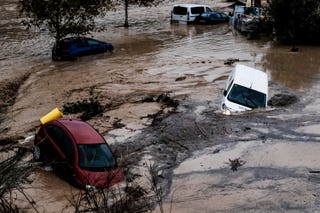
The held last week in Canberra made one thing abundantly clear: Australia is facing a threat that we have yet to fully confront. or signup to continue reading The growing risk posed by climate change is not just an environmental issue - it is a security crisis of the highest order, threatening the human security of our nation and the region. While much attention is directed towards traditional threats, such as , the reality is that climate disruption represents the danger to our security and economic stability.
The Summit highlighted that we are on a trajectory towards a world with more than 3 degrees of warming. This isn't a distant threat; but a future that's becoming increasingly likely due to our current emissions path. The consequences of such an increase in global temperature are catastrophic.
At this level of climate change, food production could plummet by up to 30 per cent, water scarcity will become the norm, and millions of people across Africa, Asia, and the Pacific could be displaced. The following instability could ripple through nations, creating a crisis that reaches our doorstep, overwhelming infrastructure and triggering social unrest. Here in Australia, we are faced the prospect of large parts of our northern region within three decades or so.
Communities, defence bases, and essential infrastructure are at risk of becoming obsolete. Despite these looming threats, our national response has been woefully inadequate. We are unprepared for the scale of disruption that unmitigated climate change will bring.
While billions of dollars are funnelled into traditional defence strategies, aimed largely at managing tensions with China, this will do nothing to address the far more wide-reaching threat of climate disruption. One recent example of the fallout that climate-related disasters can have is , which struck the United States and caused $A230 billion in damage. To put that into perspective, that is almost 40 per cent of Australia's annual .
Even more concerning is that only a fraction of the affected properties there were insured, highlighting the long-term social and economic impacts that will follow. Climate change amplified Helene's impact, increasing rainfall by up to 50 per cent and making such extreme weather events 20 times more likely. If we continue on our current path, these types of disasters will become frequent, not just in the USA but here in Australia and our region as well.
This is an issue about human security and the survival of our society. The risks that climate change poses far exceed those of conventional security threats, so we must radically rethink our approach. , launched at the National Climate Security Summit, outlines the necessary steps to effectively respond.
Firstly, we need an emergency mobilisation effort akin to wartime level responses. Decarbonisation must happen at an accelerated pace, with coordinated actions across all levels of government to confront the climate crises that is already unfolding. One of the central recommendations of the action plan is the creation of a Climate Threat Intelligence Unit.
This unit would provide real-time insights into the evolving risks that climate change poses, enabling us to take preventive action before crises escalate. In addition, an Abrupt Climate Change Early Warning System would help predict and manage sudden changes in weather patterns and their potential impacts on infrastructure, food supply chains, and public safety. Australia must also take on a leadership role in the Asia-Pacific, working closely with our regional neighbours to strengthen resilience.
The displacement of millions of people due to food and water shortages is not just a humanitarian issue - it's a security one. Without strong regional co-operation, these impacts will lead to conflict, instability, and mass migration, placing immense pressure on nations capacity to respond. Australia's future security hinges on our ability to create meaningful alliances with both large and small nations across the region.
Supporting the climate preparedness efforts of developing nations must be a priority for Australia. The stakes have never been higher. This is not just about safeguarding our environment - it is about securing the future of our country and our region in an increasingly unstable world.
Australia must face this threat, protect people, and take a lead in the global fight against climate change before it's too late. The alternative is a future where food shortages, mass displacement, and escalating conflicts become the new normal. We cannot afford to wait.
Advertisement Sign up for our newsletter to stay up to date. We care about the protection of your data. Read our .
Advertisement.










